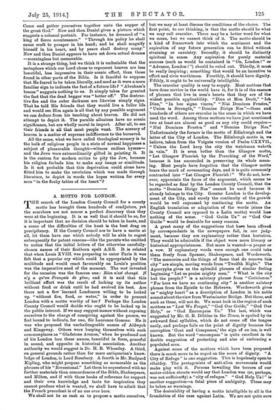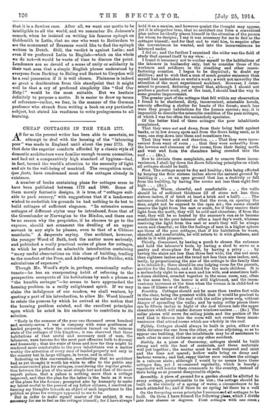A MOTTO FOR LONDON.
THE search of the London County Council for a county motto has brought them hundreds of coadjutors, yet the searchers are not nearer a perfect discovery than they were at the beginning. It is as well that it should be so, for it is important that no decision should be taken in haste, and a sense of the difficulties of the hunt is the best drag on precipitancy. If the County Council are to have a motto at all, let them have one which nobody will be able to regret subsequently for patent reasons—like the parents who omitted to notice that the initial letters of the otherwise carefully- chosen names of their firstborn spelt A.S.S. It is related that when Louis XVIII. was preparing to enter Paris it was felt that a popular cry which could be appropriated by the multitude and would react favourably on Louis's position was the imperative need of the moment. The mot invented for the occasion was the famous one : Bien n'est change. ii n'y a qu'un Francais de plus; and it is said that this brilliant effort was the result of locking up its author without food or drink until he had evolved his best. Are there not a few learned Londoners willing to be locked up "without fire, food, or water," in order to present London with a motto worthy of her ? Perhaps the London County Council would decide who ought to be locked up in the public interest. If we may suggest names without exposing ourselves to the charge of conspiring against the person, we feel bound to indicate, for one, Sir Laurence Gomme. He it was who proposed the unchallengeable names of Aldwych and Kingsway. Others were busying themselves with such commonplaces as "Gladstone Avenue," when he produced out of his London lore these names, beautiful in form, graceful in sound, and apposite in historical association. Another authority we would suggest is Dr. H. B. Wheatley. A third, on general grounds rather than for mere antiquarian's know. ledge of London, is Lord Rosebery. A fourth is Mr. Rudyard Kipling, who might propose something as memorable as the phrases of his "Recessional." Let them be sequestered with no further materials than concordances of the Bible, Shakespeare, and Milton, and if with these books of reference for support and their own knowledge and taste for inspiration they cannot produce what is wanted, we shall have to admit that the French precedent is of no use over here.
We shall not be so rash as to propose a motto ourselves, but we may at least discuss the conditions of the choice. The first point, to our thinking, is that the motto should be what we may call oracular. There may be a better word for what we mean, but we cannot think of it. The motto should be a kind of framework into which the sentiment and the aspiration of any future generation can be fitted without straining or casuistry. Secondly, it should be distinctly spiritual in sense. Any aspiration for purely material success (such as would be contained in "On, London I" or "Advance, London ! ") should be ruled out. Thirdly, it must be really inspiring ; something that would be an incentive to effort and civic worthiness. Fourthly, it should have dignity. Fifthly, it ought to be universally intelligible.
The oracular quality is easy to supply. Most mottoes that have done service in the world have it, for it is of the essence of phrases that live in men's hearts that they are of the widest possible applicability. "Dieu et Mon Droit," " Ich Dien," "In hoc signo vinces," "Nisi Dominus Frustra," "Union is Strength," "Domino Dirige Nos "—these and hundreds of others are oracular in the sense in which we have used the word. Among those mottoes we have just mentioned two at least are almost as good as any city could require- " Nisi Dominus Frustra " and "Domino Dirige Nos." Unfortunately the former is the motto of Edinburgh and the latter of the City of London. The Edinburgh motto is, we believe, taken from the Vulgate version of Psalm CXXVIL, " Unless the Lord keep the city the watchman waketh in vain." It is even better than the Glasgow motto, "Let Glasgow Flourish by the Preaching of the Word," because it has succeeded in preserving its whole mean- ing. Most people have forgotten that the Glasgow motto bears the mark of covenanting days, and it is quite commonly contracted into "Let Glasgow Flourish !" We do not, how- ever, appreciate the force of the argument, which seems to be regarded as final by the London County Council, that the motto "Domino Dingo Nos" cannot be used because it already belongs to the City. Greater London is the develop- ment of the City, and surely the continuity of the growth would be well expressed by continuing the motto. An English translation or adaptation of the words (since the County Council are opposed to a Latin motto) would lose nothing of the sense. "God Guide Us" or "God Our Guide" would be desirable for many reasons.
A great many of the suggestions that home been offered by correspondents in the newspapers fail, in our judg- ment, because they are explanatory rather than hortative. They would be admirable if the object were mere literary or historical appropriateness. But more is wanted—a prayer or a vow. If explanatory words were enough one could take them freely from Spenser, Shakespeare, and Wordsworth. "The memories and the things of fame that do renown this city" are simple, moving words from "Twelfth Night." The Apocrypha gives us the splendid phrases of similar feeling beginning "Let us praise mighty men." "What is the city but the people ? " is a salutary phrase from " Coriolanus." "For here we have no continuing city" is another salutary phrase from the Epistle to the Hebrews. Wordsworth gives us "mighty heart" as a description of London in his noble sonnet about the view from Westminster Bridge. But these, and such as these, will not do. We must look in the region of such mottoes as "Lest We Forget," "God Our Guide," "God Our Help," or "God Encompass Us." The last, which was suggested by Mr. G. B. Dibblee in the Times, is spoiled by its awkward final syllables, which do not come off the tongue easily, and perhaps fails on the point of dignity because the corruption 'Goat and Compasses,' the sign of an inn, is well known. But the word " encompass " is quite excellent in its double suggestion of protecting and also of embracing a populated area.
Against some of the mottoes which have been proposed there is much more to be urged on the score of dignity. "A City of Refuge " is one suggestion. This is hopelessly open to ribaldry. The protagonists of anti-alien movements would make play with it. Persons bewailing the terrors of our motor-ridden streets would say that London was (or, perhaps, was not sufficient:1y) a "city of refuges." "God Help Us!" is another suggestion—a fatal piece of ambiguity. These may be taken as warnings.
The desirability of having a motto intelligible to all is the foundation of the case against Latin. We are not quite sure
that it is a flawless case. After all, we want our motto to be intelligible to all the world, and we remember Dr. Johnson's remark, when be insisted on writing his famous epitaph on Goldemith in Latin, that no one who went to Rotterdam to see the monument of Erasmus would like to find the epitaph written in Dutch. Still, the verdict is against Latin; and even if we preferred Latin to English—which on the whole we do not—it would be waste of time to discuss the point. Londoners are so devoid of a sense of unity or solidarity in their vast area that a simple English phrase understood by everyone from Barking to Ealing and Barnet to Croydon will be a real possession if it is well chosen. Plainness is indeed so great a desideratum from this standpoint that it might well be that a cry of profound simplicity like "God Our Help !" would be the most suitable. But we hesitate definitely to propose a motto. It is easier to draw up terms of reference—rather, we fear, in the manner of the German professor who shrank from writing a book on any particular subject, but stated his readiness to write prolegomena to all learning.







































 Previous page
Previous page